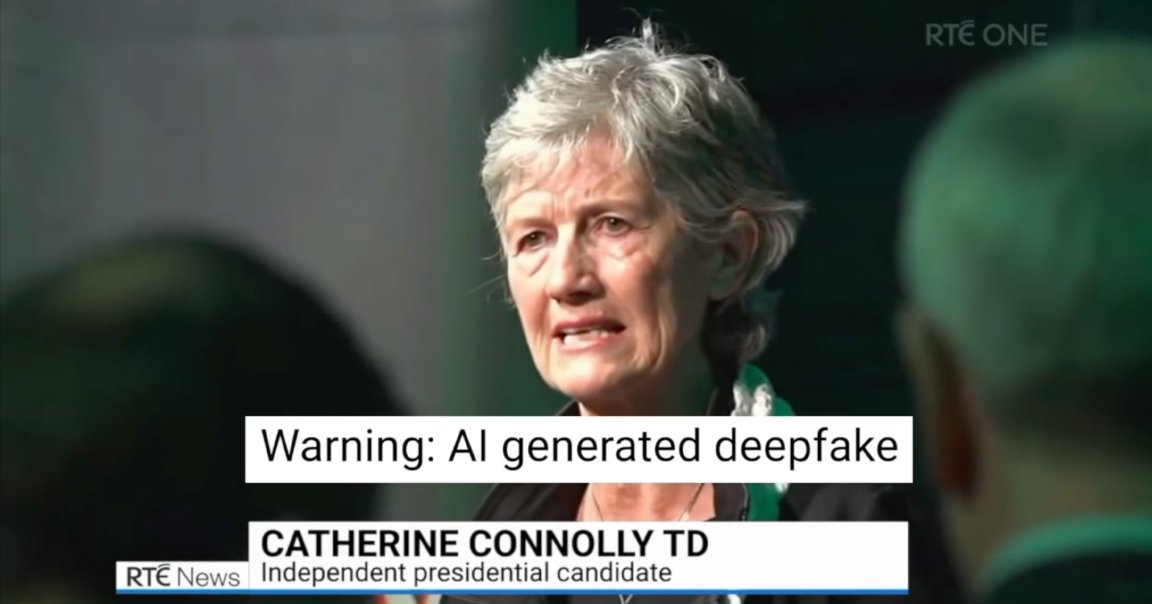
Ireland is just days away from electing a new president — a mostly ceremonial role, though the office does carry constitutional responsibilities like appointing the Taoiseach, or prime minister, and referring legislation to the courts, granting the post real authority.
This year, independent progressive Catherine Connolly has surged ahead in the polls, commanding a comfortable lead over her sole rival, the center-right Heather Humphreys. That makes it all the more jarring that, just days before the vote, a video started making the rounds of Connolly telling supporters she was dropping out of the race, automatically granting Humphreys the presidency.
There’s just one small wrinkle: Connolly never actually withdrew. It was the latest case of a hoax perpetuated by a deepfake, meaning an AI-generated recording that misrepresents real people to spread disinformation or sow other types of chaos.
It all started on Meta’s Facebook, where a lookalike account called “RTÉ News AI,” after Ireland’s public service broadcaster, posted the 40 second clip, which was allowed to stay up for 12 hours. During that time, it garnered 30,000 views and was shared hundreds of times before the platform finally scrubbed it, according to The Irish Times.
While some deepfakes are pretty easy to spot if you know what to look for, this one was slick.
It opens with a news desk reporter for RTÉ announcing that “Catherine Connolly has confirmed her withdrawal from the presidential race.” In typical news broadcast fashion, it then cuts to tightly edited, synthesized footage of the politician, plastered with RTÉ chyrons to look like a real broadcast.
Arguably the biggest tell comes after the faux–Connolly announces her withdrawal, when characteristically un-Irish voices from the crowd holler “Catherine, no!” The clip then flashes back to yet another reporter, who informers the viewer that, “simply put, Friday’s election is now cancelled. It will no longer take place as previously planned. But as for Heather Humphreys, she will become the winner automatically and will be appointed tomorrow.”
A spokesperson for Coimisiún na Meán, Ireland’s media censor, said the agency had “contacted the platform concerned to understand the immediate measures they have taken in response to this incident, and have reminded the platform of their obligations under the EU Digital Services Act relating to protecting the integrity of elections.”
Ireland has an odd history with AI hoaxes. Last year, hundreds gathered in the streets of Dublin to await a Halloween parade that would never come. The event had been dreamt up by a website based out of Pakistan, which used ChatGPT to exploit Google’s SEO system.
Meta, for its part, has been the epicenter of more than a few geopolitical scandals. There was the infamous Cambridge Analytica affair, in which 50 million Facebook profiles were scraped to build software in order to influence American voters in the 2016 elections. Lesser known was the company’s role in the genocide of Rohingya Muslims in Myanmar, in which viral misinformation spread on Facebook was directly responsible for inciting an explosion in political violence.
The Irish presidential election might be small potatoes in comparison, but it’s a glaring signal that Facebook and its parent company Meta are still incredibly vulnerable to this kind of malicious interference.
More on Meta: Meta Employee Creates AI App That Deepfakes the Dream Vacation You Couldn’t Afford